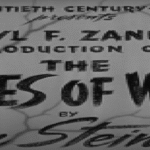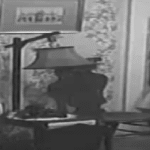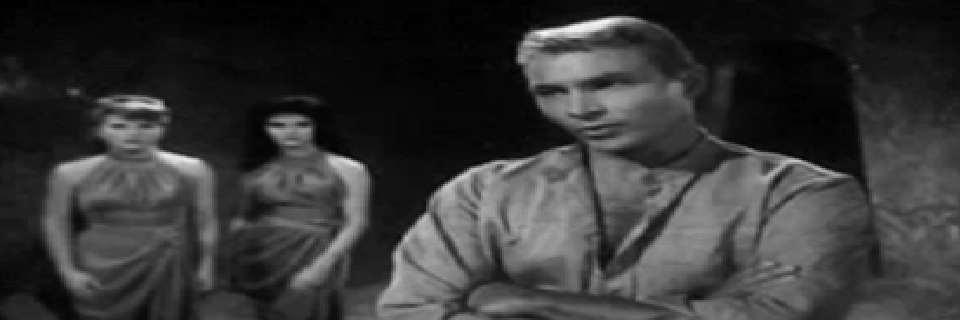The Phantom Planet, a 1961 science fiction film directed by William Marshall, presents a tale of space exploration laced with Cold War anxieties and a fascination with the unknown. The story unfolds in the then-futuristic setting of 1980, where Earth’s Space Exploration Wing has begun regular travel across the solar system. A mysterious series of spacecraft disappearances near the orbit of Saturn draws the attention of Commander Frank Chapman, a seasoned astronaut sent to investigate the phenomenon alongside his colleague, Lieutenant Ray Makonnen.
As they near the danger zone, their spacecraft is caught in a strange gravitational pull that forces Chapman to make an emergency exit. Tragically, Makonnen is lost in the process, and Chapman lands alone on an asteroid. What initially seems like a barren, lifeless rock soon reveals a hidden world. Chapman is rendered unconscious and mysteriously shrunk to a fraction of his original size due to the planet’s strange atmospheric properties. Upon awakening, he finds himself captured by a diminutive but advanced race of people living inside the asteroid, which they call Rheton.
Rheton is an invisible, mobile planetoid with advanced technology, able to manipulate gravity and power, explaining the spacecraft disappearances. The Rhetonians are ruled by a wise elder named Sessom, who oversees a society bound by order and science, though one tinged with suspicion of outsiders. Chapman is initially viewed as a threat, a possible spy, and is subjected to a trial to determine his fate. Rather than immediate punishment, Sessom decides to observe Chapman, intrigued by his bravery and curiosity.
Chapman soon learns of the internal strife plaguing Rheton. The planet is under constant threat from the Solarites, a hostile alien race seeking to steal Rheton’s energy technology. The Rhetonians are pacifist by nature, having developed powerful defensive capabilities but rarely engaging in active combat. Their preference for restraint is both admirable and frustrating to Chapman, who is more accustomed to taking decisive action.
The story gains a human dimension through Chapman’s interactions with two women: Liara, Sessom’s intelligent and graceful daughter, and Zetha, a mute servant girl with a mysterious past. Liara takes an intellectual interest in Chapman, but it is Zetha who stirs a deeper emotional response in him. Though she cannot speak, her expressive manner and loyalty touch Chapman, creating a romantic subplot amid the science fiction framework. This dynamic is further complicated by Herron, a jealous Rhetonian who views Chapman as both a romantic and political threat. The rivalry culminates in a ritual combat sequence, where Chapman is forced to defend himself in a form of trial by ordeal. Despite his physical disadvantage, he earns Herron’s reluctant respect, cementing his place within the Rhetonian society.
However, Chapman remains torn between his desire to return to Earth and his growing attachment to Zetha. As the Solarite threat becomes more immediate, Chapman’s combativeness and Earth-born instincts prove valuable. He assists the Rhetonians in fending off an attack, demonstrating the benefits of combining their advanced technology with his tactical mindset. During the conflict, a captured Solarite creature escapes, causing havoc inside the city. Chapman plays a key role in subduing the beast, further proving his worth.
Following the failed attack, Rheton prepares to leave its current position to ensure safety, employing its gravity-controlling technology to move silently through space once again. With the crisis averted, Sessom offers Chapman the chance to remain, even promising a place within their society. Yet Chapman feels a duty to return to his own people, believing he can best serve by bringing news of Rheton’s existence and potential.
Before departing, Zetha recovers her voice in a moment of emotional clarity, calling out to Chapman, a poignant affirmation of her feelings. It is a bittersweet farewell. When Chapman returns to his original size and is retrieved by a passing Earth ship, he finds that no time has passed in the outside world, adding a mysterious quality to his entire experience.
The Phantom Planet weaves themes of isolation, cultural misunderstanding, and the contrast between aggression and diplomacy. Though its production values and effects reflect the modest means of early 1960s science fiction, the film resonates with a contemplative tone. The use of miniaturisation as a plot device invites allegorical interpretations—Chapman’s reduction in size symbolising the humbling of humanity before the vastness of the universe.
The film’s pace is measured, leaning more toward dialogue and ideological debate than action. It reflects a transitional period in science fiction cinema, where ideas began to outweigh spectacle. The visual design, while limited, presents a stylised vision of a hidden world, with glowing chambers, stark costuming, and a sense of theatricality that adds charm. The depiction of the Solarites as lumbering, monstrous foes provides the necessary tension, though they remain secondary to the film’s more philosophical concerns.
Characterisation is sparse but functional. Chapman serves as a classic everyman—brave, slightly headstrong, but ultimately honourable. His interactions with the Rhetonians challenge his assumptions, and his growth lies in accepting the validity of an alien way of life while still remaining true to his own principles. Zetha, though silent for much of the film, is central to its emotional core. Her silence and later recovery of speech serve as metaphors for agency and connection.
The conclusion is subdued yet optimistic. Chapman’s return to Earth is not triumphant in the traditional sense, but reflective. His experience with the Rhetonians remains a secret, known only to him, lending a mythical quality to his journey. The film avoids grandiose conclusions, instead offering a quiet meditation on discovery and choice.
In summary, The Phantom Planet stands as a curious artifact of its era, blending Cold War fears, romantic adventure, and speculative philosophy into a compact narrative. It asks what it means to belong, how one balances duty with personal feeling, and whether advanced civilisation can thrive without conflict. Though modest in scale, it gestures toward the infinite, and like its eponymous phantom world, it drifts just beyond the ordinary gaze, inviting those willing to see beyond the visible.







